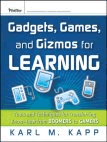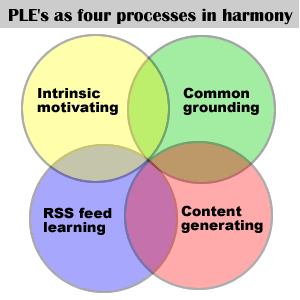
Welcome to Day Thirteen in
Week Three of Karl Kapp's Virtual Book tour that
Gordon Snyder and I are hosting. Last weekend, I journeyed through
Gadgets, Games and Gizmos for Learning (
3G4L) from cover to cover and became delighted with what I discovered. I was already sold on the value of what we learn by gaming from
my own experiences. I've already blogged about that some
here in the past few months. Karl goes beyond the value of gaming to build bridges between opposing stances about gamers.
3G4L can be used like game cheats to get to higher levels of play in the management and education of the workplace.
You may have noticed three separate islands where you work. There's an island of senior executives with their top-down, bottom line, control-freak approach to the other islands. There's a far away island of gamers thriving on fun challenges and immersive gameplay. In between, there's an island of trainers, instructional designers and content developers struggling to reach out to both of the other islands.
Without 3G4L to give us cheats, each island will continue doing what already looks necessary, productive and goal oriented. No bridges will get built between the islands. Exec Island will continue to act like bosses and Gamer Island will "rage against the machine", "cheat the system", and "stick it to the man". Instructor Island will deliver long sequences of formalized material and gamers will be "bored out of their gourd". Instructor Island will persist in trying to establish legitimacy and credibility with Exec Island by taking their side in the battle against the alienated gamers.
In the post 9/11 world on Exec Island, far off Gamer Island appears to be a terrorist training camp and the gamers look like enemy combatants. The typical MMORPG players' devotion to stockpiling weapons, annihilating NP characters, engaging in PvP combat and conducting death matches -- eliminates any prospect of constructing a bridge between those islands from the exec side. Exec Island feels fully justified in launching attacks on Gamer Island. Likewise, Gamer Island is alienated by the Exec Island's insistence on "gaming the player" without greater rewards, access or challenges. Playing the exec's game is no fun for gamers.
Building bridges is a higher level of play on each island. It's not an option without finding other resources and changing strategies at work. The best chances are building bridges started from Instructor Island. It's positioned in the middle between the execs and gamers. Yet the instructors will think siding with gamers at all will undermine their credibility and nuke the pylons of a bridge to Exec Island. Without the cheats in 3G4L, the instructors will continue to formally deliver long sequences of content and make no use of handheld gadgets, tournament events or teamwork.
Formulating sales proposals for eLearning projects is a great way for instructors to get into the minds of execs and gamers. Winning acceptance of proposals requires understanding the buyers' needs, situations and conflicts. 3G4L helps everyone on Instructor Island get their heads in the game of mapping the other islands and seeing their own island from the other vantage points.
The next level of play on Instructor Island builds the pylons in the water for a bridge toward Gamer Island. 3G4L is loaded with great game cheats for:
- matching the kind of game getting created to the kind of competency getting cultivated
- using handheld gadgets to access real time readouts and the workplace database
- parsing long sequences of instruction into short segments of automation
- converting compliance learning into F2F peer collaborations
The instructors' next level of play bridges to Exec Island. While execs insist on their view of gamers, no pylons can be built. It helps the execs to see the gamers as :
- thriving on increasingly difficult challenges and hidden clues
- improving their gaming experience with the use of cheat codes
- making complex, strategic choices while having fun
- realizing the consequences of their decisions experientially
When gamers look to execs the way they are portrayed in 3G4L, execs can change the control-freak game they've been playing. Rather than continue to boss the gamers around, it will make sense to advise the gamers on changes in their strategies at work. A bridge can be built between Exec and Gamer Islands on pylons of mutual respect and insight.
In Karl's mind and in Gadgets, Games and Gizmos for Learning, these bridges are already well in view. It's apparent how all three islands can make valuable contributions to each other. Gamers are not all the same and neither are the execs or instructors. Getting bridges built allows for appreciating unique capabilities and outlooks. Stereotypes will be replaced by more refined perceptions of individuals. Gamer 4.0 players will be challenged by Exec 4.0 and Instructor 4.0 maneuvers to up each other's game. Thanks to what Karl has given us, everyone's potential will be more fully realized while having more fun at work.






